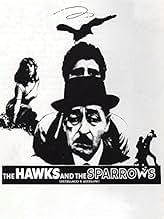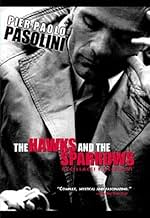IMDb-BEWERTUNG
7,2/10
5787
IHRE BEWERTUNG
Totò und sein Sohn Ninetto treiben auf einer Straße in Italien, als sie eine sprechende Krähe treffen.Totò und sein Sohn Ninetto treiben auf einer Straße in Italien, als sie eine sprechende Krähe treffen.Totò und sein Sohn Ninetto treiben auf einer Straße in Italien, als sie eine sprechende Krähe treffen.
- Auszeichnungen
- 4 Gewinne & 4 Nominierungen insgesamt
Totò
- Totò Innocenti
- (as Toto')
- …
Ninetto Davoli
- Ninetto Innocenti
- (as Davoli Ninetto)
- …
Nello Appodia
- Party Guest
- (Nicht genannt)
Gabriele Baldini
- Dante's Dentist
- (Nicht genannt)
Pietro Davoli
- Mascalzone
- (Nicht genannt)
Rossana Di Rocco
- Ninetto's Girlfriend
- (Nicht genannt)
Handlung
WUSSTEST DU SCHON:
- WissenswertesFilm's opening credits are not only displayed on screen but also comically sung in Italian to a jaunty Ennio Morricone score, with a memorably droll rhyming of the film title with the director's full name.
- Crazy CreditsThe opening credits are performed as a song.
- VerbindungenEdited into Geschichte(n) des Kinos: Une histoire seule (1989)
- SoundtracksUccellacci E Uccellini (Titoli Di Testa)
Composed by Ennio Morricone and Pier Paolo Pasolini
Performed by Domenico Modugno
Ausgewählte Rezension
"Where goes humanity?" - "I don't know!" Maybe it's a comedy, but I don't think anyone is 100% sure what kind of a film this really is. It's not really comedic, because behind all those absurdities and silliness there lies a seriously political and religious concern, a bittersweet desire and infallible disappointment. Maybe we should take the film as what it is, as one-of-a-kind, a cinematic high jump which gives rise to all sorts of speculation and conjectures without knowing where to start and where it ends.
Not only the viewer is left unsure, the protagonists are, too. They embody the condition of the film's unsureness perfectly, as well as the nature of one of the most unique works of Italian cinema, which is also the most variant and formally abstract film project of Pasolini: A weird story, a picaresque tale which mixes metaphors and cinematic references (from Keaton's statics to Chaplin's poesy of the dusty road to Fellini's clowns to Rossellini's monks); a philosophic apology which depicts the end of ideologies, the crisis of Marxism on the background of the clash of rulers and subjects (hawks and sparrows) and the unfortunate encounter of those who have the blessing of knowledge (the wise raven) and those who outlive themselves without the awareness of being part of this world: Totò and Ninetto, father and son. Both are walking the eternal road of a universe which is merciless, discuss pretentious things and express themselves with the help of their basic instincts: physical needs, but also the hate towards inferiors and subservience to superiors. On their way, they encounter the mystery of life and death (birth of a child, a family that kills themselves with gas, a funeral), as well as the mortal fear of those who starve. Until the raven appears, decides to go along with them and overwhelms them with needless wisdoms.
It's great to see Totò in here, a masterful actor who often was criminally misused in abysmal Italian entertainment movies and shows here the wide range of his talent. The interaction with the young, intuitive Ninetto Davoli is probably the biggest joy in this film.
Not only the viewer is left unsure, the protagonists are, too. They embody the condition of the film's unsureness perfectly, as well as the nature of one of the most unique works of Italian cinema, which is also the most variant and formally abstract film project of Pasolini: A weird story, a picaresque tale which mixes metaphors and cinematic references (from Keaton's statics to Chaplin's poesy of the dusty road to Fellini's clowns to Rossellini's monks); a philosophic apology which depicts the end of ideologies, the crisis of Marxism on the background of the clash of rulers and subjects (hawks and sparrows) and the unfortunate encounter of those who have the blessing of knowledge (the wise raven) and those who outlive themselves without the awareness of being part of this world: Totò and Ninetto, father and son. Both are walking the eternal road of a universe which is merciless, discuss pretentious things and express themselves with the help of their basic instincts: physical needs, but also the hate towards inferiors and subservience to superiors. On their way, they encounter the mystery of life and death (birth of a child, a family that kills themselves with gas, a funeral), as well as the mortal fear of those who starve. Until the raven appears, decides to go along with them and overwhelms them with needless wisdoms.
It's great to see Totò in here, a masterful actor who often was criminally misused in abysmal Italian entertainment movies and shows here the wide range of his talent. The interaction with the young, intuitive Ninetto Davoli is probably the biggest joy in this film.
- spoilsbury_toast_girl
- 1. Nov. 2008
- Permalink
Top-Auswahl
Melde dich zum Bewerten an und greife auf die Watchlist für personalisierte Empfehlungen zu.
- How long is The Hawks and the Sparrows?Powered by Alexa
Details
Box Office
- Weltweiter Bruttoertrag
- 3.348 $
- Laufzeit1 Stunde 29 Minuten
- Farbe
- Sound-Mix
- Seitenverhältnis
- 1.85 : 1
Zu dieser Seite beitragen
Bearbeitung vorschlagen oder fehlenden Inhalt hinzufügen

Oberste Lücke
By what name was Große Vögel, kleine Vögel (1966) officially released in India in English?
Antwort


















